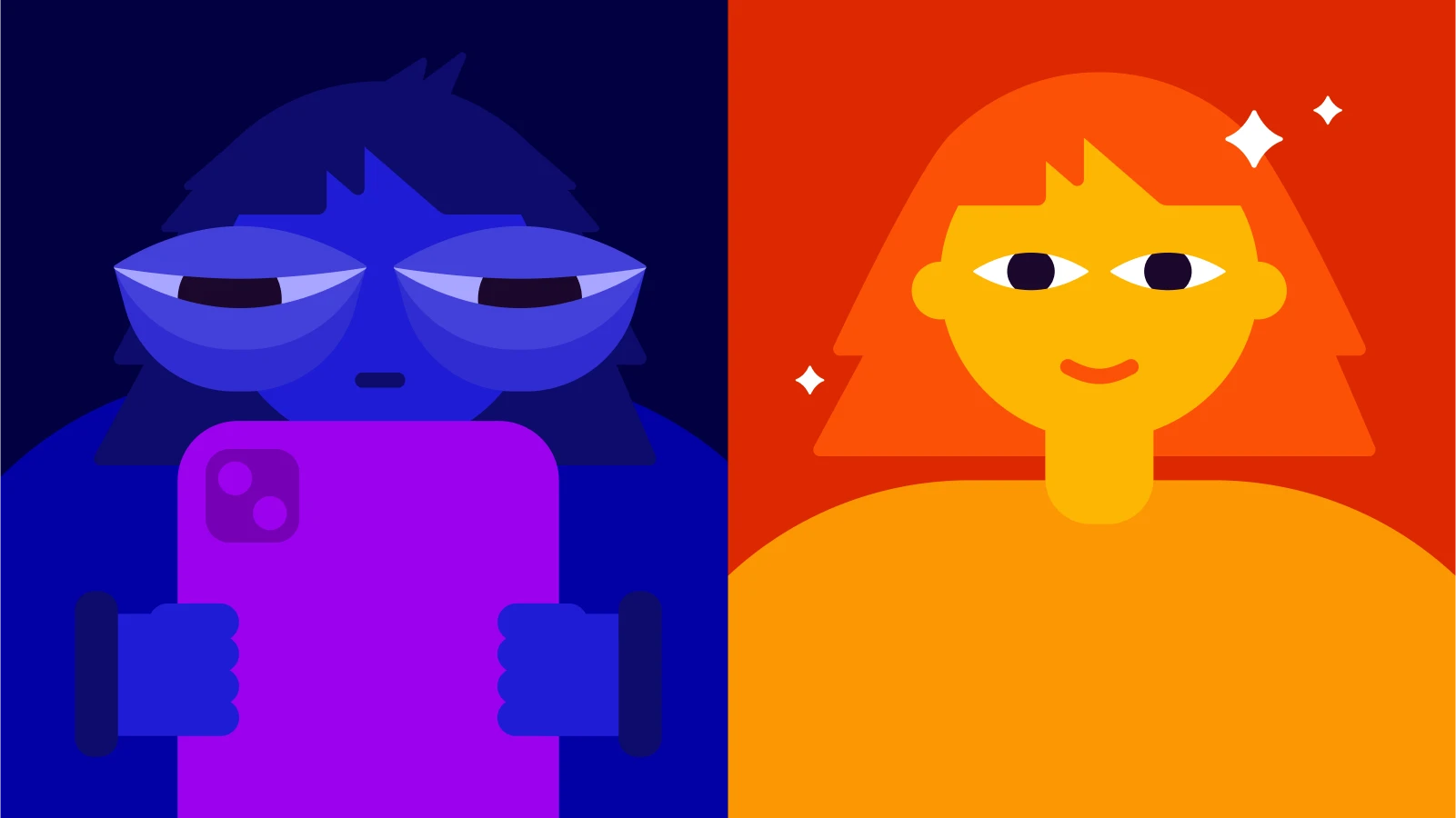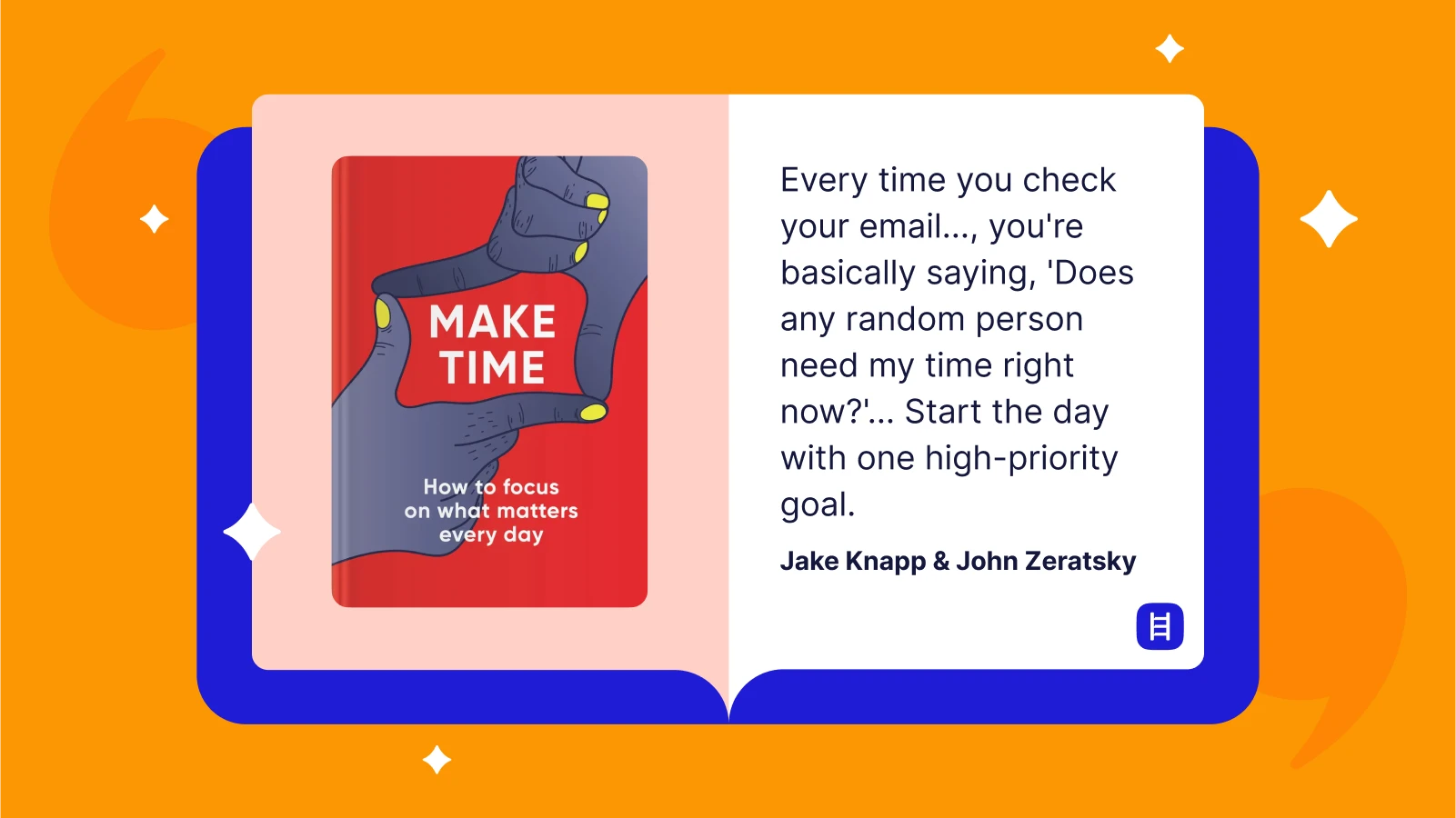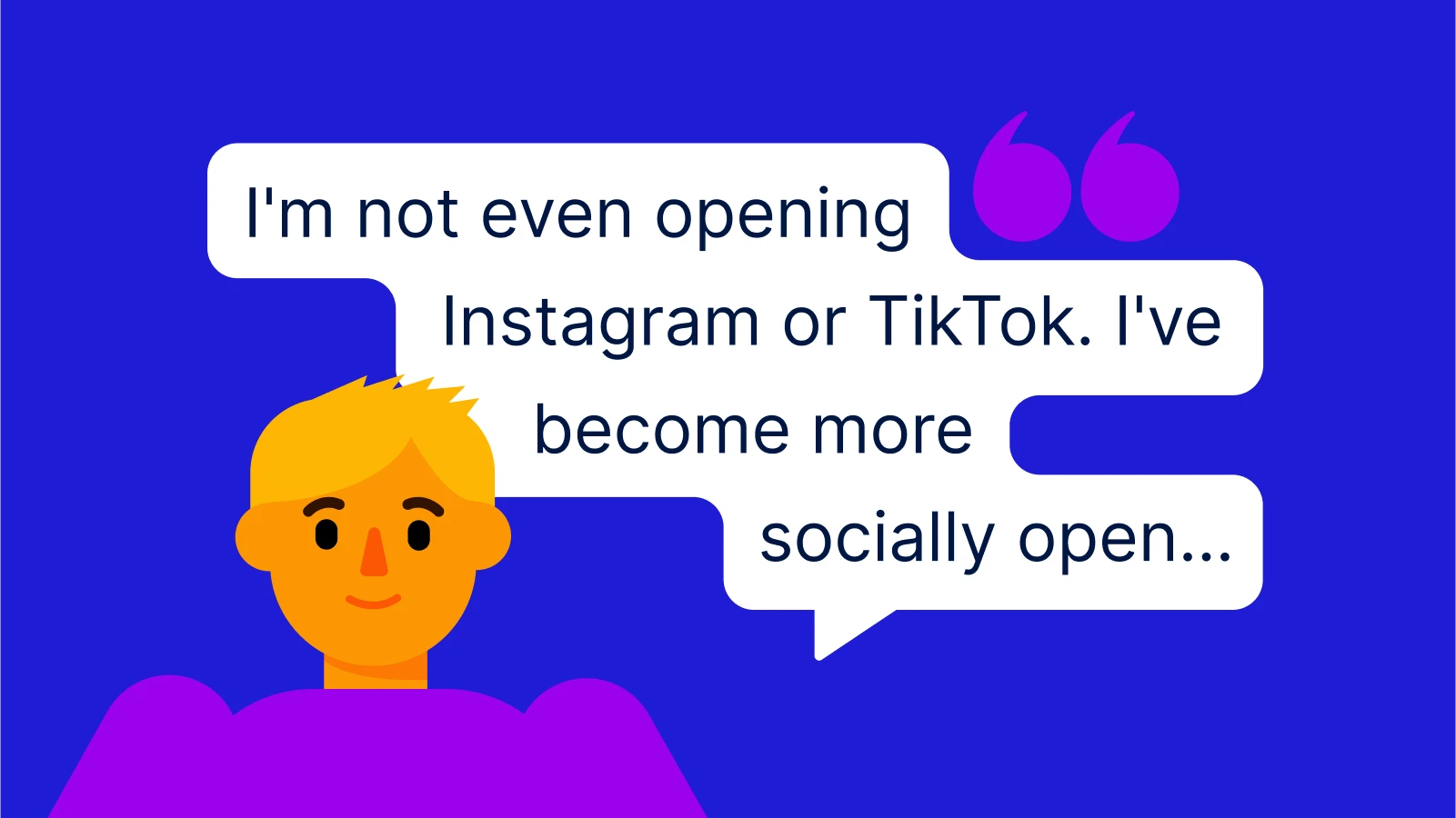What if you stepped back from social media to enjoy life off screens? Taking breaks can help you control your e-habits, reduce aimless scrolling, and find fulfillment through meaningful relationships, self-care, creative pursuits, and microlearning apps like Headway. Let's explore 21 pro tips for digital detox and real-life pleasure.
You can replace social media with activities that nurture real connections, creativity, productivity, and mental well-being. Try some of these popular options:
Call your loved ones regularly
Join a church or a community group
Participate & initiate local community events
Learn a new language
Explore a new craft (pottery, jewellery crafting, etc.)
Learn to play guitar / any instrument
Start gardening (outdoors & indoors)
Play classic card and board games like UNO & chess
Check out the article below to discover these alternatives and more, and see how they can brighten your daily life.
What to replace social media with – based on your goal
To replace social media use effectively, identify its underlying need — connection, growth, focus, peace — to ensure alternatives support your personal development.
There is no one-size-fits-all solution. The best way to reduce screen time is to understand why you need to use your smartphone and laptop in the first place. Reflect on why you want to change.
Ready to find your path? Our short quiz will help you identify your unique needs and explore tailored alternatives.
What's your social media replacement path (type)?
Thinking of cutting back on social media? Take this quick quiz to discover your perfect replacement path — the activities and habits that can fill your feed-free time with more meaning and joy.
Now, take a moment to explore the strategies in the table below. Consider the time and resources each option requires, and choose the path that fits your personality.
Twenty-one extra alternatives to replace social media with (grouped by need)
Replace the illusion of reality from social media with activities that nurture deep connections, learning, creativity, and wellness.
Prioritizing self-care can turn passive scrolling into a fulfilling experience. Here are 21 options (with estimated times they would take a day), grouped by category and complemented with a quote, to help you meet personal goals and break free from isolation.

Goal A: To belong and to connect with others (10-15 min)
Alternative 1 ⇒ Contact your loved ones every morning or during a break.
Alternative 2 ⇒ Join a local church, poetry and prose classes, or a hiking and trail running club.
Alternative 3 ⇒ Attend local events or workshops (open lectures, street dancing flash mobs, etc.) that match your personal interests.
➥ 'How to Win Friends and Influence People' by Dale Carnegie and his co-authors offers some pointers on how to build deeper in-person connections in a digital era.
"Become meaningful in your interactions, and the path to success in any endeavor is simpler and far more sustainable."
Goal B: To boost productivity (30 min)
Alternative 4 ⇒ Use "theme days/weeks" to focus on specific tasks, such as "Marketing Monday" or "Development Tuesday."
Alternative 5 ⇒ Set dedicated work blocks & fill out a daily planner to minimize time gaps.
➥ 'Deep Work' by Cal Newport can help you "engineer" a distraction-free space.
"To remain valuable in our economy… you must master the art of quickly learning complicated things."
Goal C: To foster intellectual growth (15-20 min)
Alternative 6 ⇒ Learn a new language using learning apps like Duolingo or Teuida for short, gamified lessons.
Alternative 7 ⇒ Master learning techniques like active recall (retrieval practice).
Alternative 8 ⇒ Try speed reading and typing exercises.
➥ 'Limitless' by Jim Kwik will expand your learning toolkit.
"Our most precious gift is our brain… It is the gateway to… experiencing life. It allows us to innovate, grow, and accomplish."
Goal D: To relax on purpose (20-30 min)
Alternative 9 ⇒ Hunt for "outdoorphins"; take regular walks in a park, woods, or a quiet street. Listen to guided meditations via apps like Headspace or Insight Timer.
Alternative 10 ⇒ Practice self-care rituals like sipping tea, moving meditation ("Tai Chi"), or deep breathing.
➥ 'The Power of Now' by Eckhart Tolle will assist you in exploring relaxing activities.
"It is not uncommon for people to spend their whole life waiting to start living."
Goal E: To ignite creativity (15 min)
Alternative 11 ⇒ Write your thoughts in a journal or an app like Day One.
Alternative 12 ⇒ Try cooking or baking from scratch, or any DIY project at home.
Alternative 13 ⇒ Learn how to crochet or make pottery. Photography and sketching are fantastic options too.
Alternative 14 ⇒ Learn to play an instrument (saxophone, guitar, or keyboard).
➥ Julia Cameron's 'The Artist's Way' will help you rediscover your creative self.
"No matter… whether making art is your career or your hobby or your dream, it is not too late or… too silly to work on your creativity."
Goal F: To nurture mental health and physical well-being (10-20 min)
Alternative 15 ⇒ Get involved in gardening. Caring for plants is a natural antidepressant (it is a source of endorphins and vitamin D) and trains your observation skills.
Alternative 16 ⇒ Declutter your home, workplace, and digital spaces (like iCloud). Use decluttering apps like Clutterfree or brain training apps like Elevate to improve cognitive functions.
Alternative 17 ⇒ Incorporate gym training sessions or any physical activity (like tennis, climbing, or bouldering) into your routine.
Alternative 18 ⇒ Tune in to a podcast or an audiobook while you're commuting or exercising.
➥ Start from 'The Happiness Project, Tenth Anniversary' by Gretchen Rubin to set the tone.
"Experts say that denying bad feelings intensifies them."
Goal G: To level up your focus (15 min)
Alternative 19 ⇒ Opt for a jigsaw, Sudoku, crossword, chess, card game, or table games like UNO or Dobble: these classic activities require focus, noticing patterns, and solving problems.
Alternative 20 ⇒ Engage in activities such as archery, target shooting, golf, fishing, or bowling to enhance your precision, patience, and mental strategy.
Alternative 21 ⇒ Try using a Pomodoro Timer, such as Pomofocus, to help level up your concentration span.
➥ For expert advice, read Johann Hari's 'Stolen Focus.'
"The more novels you read, the better you were at reading other people's emotions… This wasn't just a sign that you were better educated… Reading nonfiction books… had no effect on your empathy."
Want to know how to make your new habits stick? Let's explore how you can get out of the habit loop.
How to make the switch stick: Get out of your habit loop

To stick with your new habits, choose healthier cues and rewards over social media stimuli. This can help you lessen your screen time and dodge "the scrolling rabbitholes." As Jake Knapp and John Zeratsky assert in 'Make Time,' don't shy away from starting small:
"Every time you check your email..., you're basically saying, 'Does any random person need my time right now?'... Start the day with one high-priority goal."
James Clear agrees with this perspective, highlighting a golden rule of consistency in his bestselling 'Atomic Habits' (published just a few weeks after 'Make Time' ):
"The seed of every habit is a single, tiny decision. But as that decision is repeated, a habit… grows stronger."
He provides a detailed plan for creating new, brain-enhancing habits and explains that "neurological habit loop automizes over time" and has three parts:
➤ Cue: The trigger for the behavior, like boredom or a notification sound.
➤ Routine: The action you take, like using your apps.
➤ Reward: The benefit you gain, like a dopamine hit from a liked story or post.
To break this cycle, it's crucial to identify cues and triggers (such as stress from an overwhelming to-do list) and fleeting rewards (like a temporary escape). Instead of just offering to stop, Clear explains how to create "obvious, attractive, easy, and satisfying" routines.
Headway's "Daily Reminder" feature helps swap mindless social media scrolling for inspiring reads that spark curiosity. The app's downloadable habit tracker (in PDF) will assist you in visually tracking your progress and reinforcing new habits.
From screen time to self-care: Five habits that transform your day
The following list offers tips for transforming your habits by swapping out quick-fix routines for more rewarding alternatives that bring lasting benefits to your life.
1. Monotony and breaks in tasks
Before: Mindlessly scrolling TikTok, Instagram, or Snapchat
Old reward: Fleeting amusement, distraction, burst of dopamine
After: Read one summary a day, learn a couple of phrases in a different language, or tune into your favorite podcast
New reward: Feeling accomplished, gaining new knowledge, and enjoying mental stimulation
Resource: "Your Guide to a Better Brain Health, Focus, and Memory"
2. Waiting in a long line
Before: Checking for updates
Old reward: Immediate satisfaction, evasion of boredom
After: Review to-do list, listen to a short part of an audiobook, practice deep breathing
New reward: Efficiency, tranquility, intentional use of free time
3. Experiencing stress or feeling overloaded
Before: Spending hours aimlessly scrolling through negative news or memes
Old reward: Temporary escape, feelings of detachment
After: Guided meditations, tech-free walk, regular journaling
New reward: Decreasing stress, gaining clarity, managing emotions
Resource: "Practical Steps to Help You Recover from a Burnout and Reclaim Your Zest for Life"
4. Getting up in the morning
Before: Grabbing the phone first to go through social media sites
Old reward: Relief from FOMO, getting quick updates
After: Read a chapter from a printed book, organize your schedule for the day, and do some gentle stretching
New reward: Intentional beginning of the day, decreased anxiety, enhanced concentration
Resource: "How to Change Your Life in 30 Days: A Comprehensive Guide to Personal Transformation"
5. Before going to sleep
Before: Browsing social media while in bed
Old reward: Winding down, last-minute adjustments
After: Enjoy a soothing playlist, go through a summary, and get ready for bedtime
New reward: Improved sleep quality, tranquility of mind, readiness for the next day
Resource: "How to Stop Scrolling Addiction with Headway App"
Let's now discover what the Headway users have to say about embracing the trend of stepping back from the digital hustle culture.
Headway's user testimonials: Real-life transformations
The app's user testimonials highlight its strong impact: millions of readers around the world use Headway to learn a minimalist lifestyle. As Oliver Burkeman states in 'Four Thousand Weeks,'
"What you pay attention to will define, for you, what reality is."
What users are saying
Microlearning techniques seem to have massive potential to enrich people's relationships and social lives.
"I'm not even opening Instagram or TikTok. I've become more socially open…"

The platform's audience largely agrees that the app can be an excellent accessory in replacing unproductive online habits. They also appreciate its spaced repetition feature for training their skill to retain and recall information.
"It really helps me memorize and apply knowledge. Reading nonfiction no longer feels like a chore, and I can see the impact."
Almost everyone seems to be particularly fond of Headway's audio features that turn passive time — like a commute or a workout — into productive studying sessions.
"You can learn the essence of three or four books in an hour walk."
Subscribers generally report that the app actively assists them in moving from unreasonable consumption to more productive usage.
How Headway helps you replace social media the smart way
Headway's microlearning represents one of the best alternatives to endless scrolling, which clips our attention spans. It's easy-to-read 15-minute summaries of nonfiction bestsellers stimulate active skill development and personal growth.
Here's how Headway helps you replace social media:
Gamified learning: Challenges and reader trackers facilitate motivation, while spaced repetition and flashcards increase memory retention.
Positive reinforcement: The app activates the brain's dopamine reward system (via streaks and badges), promoting individual progress through positive behaviors.
Personalized content: Headway provides a continuous flow of relevant, customized content tailored to the user's interests and personality.
When boredom or stress hits, you can embrace insights through the learning loop of ⇒ (1) inspiration ⇒ (2) action ⇒ and (3) consistency.
Ready to boost your smarts? Download Headway from the App Store or Google Play and transform your screen time. Join over 50M+ users on this exciting journey to self-improvement.
The reasons you'll win by quitting social media
You should replace social media because this will help you to reduce anxiety, reclaim focus, and live more intentionally in the beyond-the-screen realm.
Decline in well-being: Excessive use increases anxiety, hinders concentration, and disrupts sleep. Worldwide, the average screen time per day is about 6 hours and 40 minutes, leading to anxiety and depression among users.
Fostered isolation and social exclusion: Originally meant to connect people, social media algorithms have heightened feelings of isolation and exclusion instead.
Addictive by design: In 'Digital Minimalism,' Cal Newport cites 77% of users who can't help but reload their profile pages every other hour. He calls checking your "likes" a "new smoking": we hardly exercise willpower and moderation.
The dopamine trap: Dopamine release from platforms traps users in a cycle, making real life feel less worthy of attention, distorting decision-making, and emotional regulation.
Negative impact on relationships and self-worth: Social networks can diminish genuine relationships by enabling comparisons to idealized versions of others.
In today's world, avoiding loneliness and the challenges of addiction requires prioritizing real human connections over engagement with augmented and virtual realities. Intentional alternatives tailored to our character and personality are the best way to counter these harmful patterns.
FAQs: Healthy alternatives to social media
What can I do instead of using social media when I'm bored?
Instead of scrolling on social media, read a book summary on Headway, listen to a new podcast, go for a short walk, or have a language learning session via an app. These activities keep your mind active and help you grow.
Can I quit social media slowly?
Yes, quitting gradually can work better. Set a sharp time limit for all your social media apps, turn off unnecessary notifications, or change one scrolling habit (like doom scrolling before bed) for a healthier choice (like meditation) from your to-do list.
What if I need social media for work (like LinkedIn)?
Set clear boundaries for work-related sites like LinkedIn. Pick specific times to use social media for work. Use tools to block personal social media during work hours. Instead of scrolling, use your breaks for productive activities, like reading a 15-minute summary.
How can I fight the fear-of-missing-out when deactivating my profiles?
Focus on the "joy of missing out" (JOMO) instead. Enjoy new things and experiences. And remember that the best connections and moments in life often happen offline. Build your real life, and you'll feel less drawn to social media apps.
What are some quick, brain-feeding activities for short bursts of free time?
For quick activities, listen to a song from a playlist, practice a few phrases of a new language, try a short guided meditation, or use a brain-training app. These options provide quick engagement and avoid the downsides of social media.













